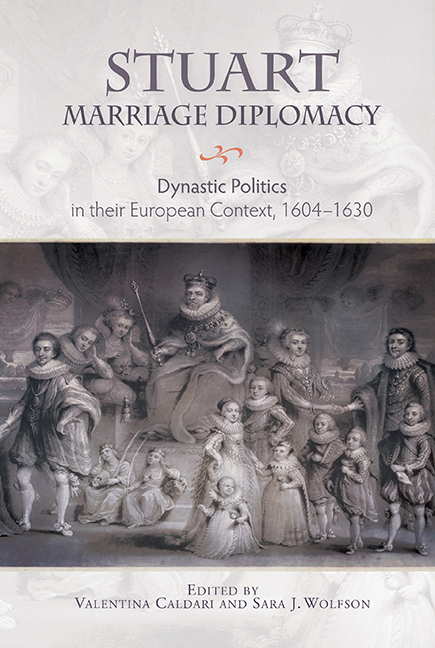Book contents
- Frontmatter
- Contents
- List of Illustrations
- List of Contributors
- Acknowledgements
- List of Abbreviations
- Introduction
- Part One Marriage and the Court
- Part Two Marriage and Politics
- Part Three Marriage and War
- Part Four Marriage and News
- 12 Secrecy, Counsel and Public Opinion during the Spanish and French Matches
- 13 The Spanish Match and Anglo-Dutch Publicity
- 14 ‘Whereof the world now stands in admiration’: Reporting on the Spanish Match from the Habsburg Netherlands
- Part Five Marriage and Continental Europe
- Part Six Marriage and Ceremony
- Bibliography
- Index
- Studies in Early Modern Cultural, Political and Social History
13 - The Spanish Match and Anglo-Dutch Publicity
from Part Four - Marriage and News
Published online by Cambridge University Press: 24 October 2019
- Frontmatter
- Contents
- List of Illustrations
- List of Contributors
- Acknowledgements
- List of Abbreviations
- Introduction
- Part One Marriage and the Court
- Part Two Marriage and Politics
- Part Three Marriage and War
- Part Four Marriage and News
- 12 Secrecy, Counsel and Public Opinion during the Spanish and French Matches
- 13 The Spanish Match and Anglo-Dutch Publicity
- 14 ‘Whereof the world now stands in admiration’: Reporting on the Spanish Match from the Habsburg Netherlands
- Part Five Marriage and Continental Europe
- Part Six Marriage and Ceremony
- Bibliography
- Index
- Studies in Early Modern Cultural, Political and Social History
Summary
The ultimately unsuccessful negotiations for the Spanish match were not just an episode in Anglo-Hispanic relations, but a European event of great magnitude. Under the threat of a general war in Europe, the success or failure of the marriage between the Prince of Wales and the Infanta of Spain was regarded by many as crucial to the development of present and coming continental wars. Would the marriage bring about the pacification James I hoped for? Or would it rather draw England into the Habsburg camp, as the Dutch and the German Protestants feared? In 1619–23, when Frederick V's acceptance of the Bohemian crown led to the Spanish invasion of the Palatinate and the Bohemian Revolt became entangled with the Dutch war against Spain, the fortunes of Europe seemed at least in part to depend on the outcome of the diplomatic wrestling game in London and Madrid. As such, the match was also an international media event, featuring in numerous newsletters, corantos, broadsheets, and pamphlets, which were published in various languages and read and debated throughout Europe.
Recent scholarship has been deeply interested in English news and public opinion during the early 1620s. As England's choice between active intervention on behalf of the beleaguered Protestant states and diplomatic rapprochement with Spain became ever more pressing in the face of rapid developments in Bohemia, the Palatinate, Hungary and the Netherlands, continental news and Jacobean foreign policy became the subject of a major public debate that involved broad sections of English society. We now know that this brought about major changes in the English political press, which, while strengthening its ties with European publishers, developed new forms of political information, such as the newsbook and the coranto. The ‘libellous politics’ that accompanied the flow of foreign news, forced the government to deal with novel questions of censorship. The public debate on James's foreign policy, especially the hostile responses to it in print, in churches, and on the streets, blatantly exposed the faultlines in the English polity that, according to some, would widen into the rifts of civil war two decades later.
- Type
- Chapter
- Information
- Stuart Marriage DiplomacyDynastic Politics in their European Context, 1604–1630, pp. 203 - 226Publisher: Boydell & BrewerPrint publication year: 2018

